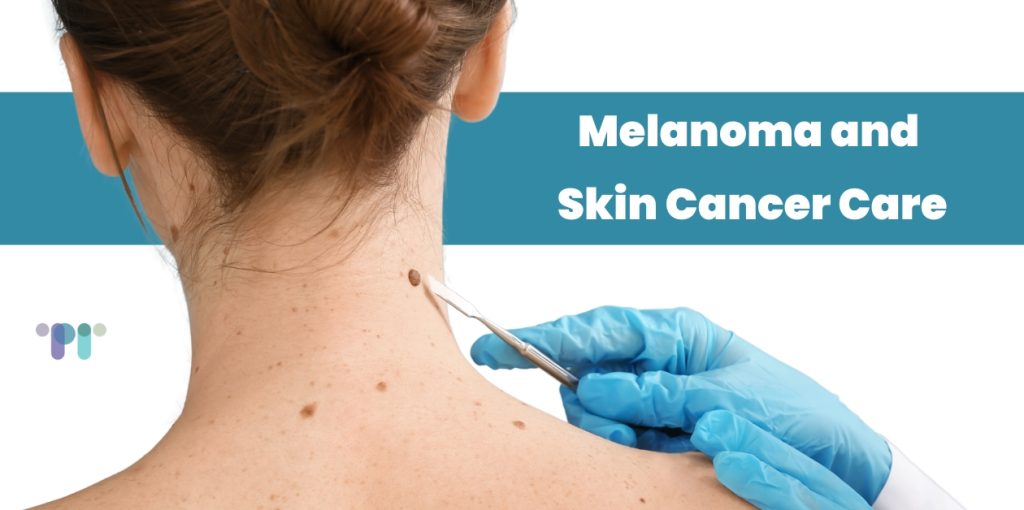Melanoma and Skin Cancer Care at PI Health Cancer Hospital, Hyderabad

Introduction
Skin cancer is one of the most common types of cancer worldwide, and among its forms, melanoma is the deadliest. However, early detection and timely treatment can significantly improve survival rates. At PI Health Cancer Hospital, we offer specialized care for melanoma and skin cancer, combining cutting-edge technology with compassionate care to ensure the best possible outcomes for our patients.
What Is Melanoma and Skin Cancer?
Skin cancer occurs when abnormal skin cells grow uncontrollably. There are several types of skin cancer, with the most common being basal cell carcinoma (BCC) and squamous cell carcinoma (SCC). Melanoma, however, is the most dangerous form, as it can spread to other parts of the body quickly if not detected and treated early.
Melanoma often develops in the cells that produce pigment (melanocytes), which gives skin its color. While melanoma can form anywhere on the body, it typically appears as a new or changing mole. If left untreated, melanoma can spread, making early detection essential.
Key Symptoms of Skin Cancer and Melanoma
It’s crucial to be vigilant about any changes in your skin. The following signs could indicate the presence of skin cancer:
- New or Changing Moles – Pay attention to any new moles or changes in existing ones, including shape, size, or color.
- Sores that Don’t Heal – Skin cancer may cause persistent sores that don’t heal over time.
- Irregular Borders – Moles or growths with jagged, uneven borders could be a sign of melanoma.
- Colour Changes – Watch for moles that change color, becoming multiple shades or unevenly pigmented.
- Itching or Bleeding – Skin cancer can cause unusual sensations such as itching or bleeding in moles or skin spots.
Use the ABCDE rule to spot signs of melanoma:
- Asymmetry – One half of the mole looks different from the other.
- Border irregularity – The edges are ragged, notched, or blurred.
- Colour – The colour is uneven and may include different shades.
- Diameter – The mole is larger than 6mm across (about the size of a pencil eraser).
- Evolving – The mole changes in size, shape, or color over time.
How to Prevent Skin Cancer
The best way to prevent skin cancer, including melanoma, is to protect your skin from harmful UV rays. Here are some expert tips:
- Use Sunscreen Daily – Apply a broad-spectrum SPF 30+ sunscreen every day, even on cloudy days.
- Seek Shade – Limit sun exposure, especially between 10 a.m. and 4 p.m. when UV rays are strongest.
- Wear Protective Clothing – Wear wide-brimmed hats, UV-blocking sunglasses, and long-sleeved shirts for added protection.
- Avoid Tanning Beds – Tanning beds significantly increase the risk of skin cancer.
- Get Annual Skin Checks – Schedule regular skin exams with a dermatologist to catch any early signs of skin cancer.
Why Choose PI Health Cancer Hospital for Melanoma and Skin Cancer Treatment?
At PI Health Cancer Hospital, we are committed to providing the best possible care for melanoma and skin cancer. Led by a team of highly skilled oncologists and dermatologists, we offer advanced diagnostic techniques and state-of-the-art treatments tailored to each patient’s needs.
Our team’s expertise includes:
- Comprehensive Skin Cancer Diagnosis – Early detection through professional skin exams, biopsy procedures, and imaging tests.
- Cutting-Edge Treatments – From surgical options, including Mohs surgery for skin cancers, to advanced immunotherapy and targeted therapies for melanoma.
- Patient-Centered Care – We believe in offering personalized care, ensuring each patient receives the support they need through every stage of their treatment journey.
Dr. Raghu Rami Reddy, our lead oncologist, is an expert in melanoma and other skin cancers. His extensive experience ensures that every patient receives the most effective, evidence-based treatment options. Dr. Reddy works closely with other specialists to provide a multidisciplinary approach to skin cancer treatment.
Risk Factors for Skin Cancer and Melanoma
While anyone can develop skin cancer, certain factors can increase your risk:
- Fair Skin, Light Hair, and Eyes – People with these characteristics are more vulnerable to sun damage.
- Excessive Sun Exposure or History of Sunburns – Long-term exposure to UV radiation increases skin cancer risk.
- Family History of Skin Cancer – A family history of melanoma or other skin cancers can increase your chances of developing the disease.
Numerous or Unusual Moles – Having many moles, or moles that appear atypical, can increase the likelihood of melanoma.
Early Detection Saves Lives
At PI Health Cancer Hospital, we emphasize the importance of regular skin checks and early detection. Melanoma and other skin cancers are treatable when caught early, which is why we urge everyone to prioritize their skin health, especially during Skin Cancer Awareness Month.
Conclusion: Protect Your Skin, Seek Expert Care
Skin cancer, especially melanoma, can be deadly, but with early detection and effective treatment, the outcomes are highly favourable. PI Health Cancer Hospital offers specialized care for melanoma and skin cancer, ensuring that every patient receives the best treatment available.
If you notice any changes in your skin or have concerns about skin cancer, don’t wait—schedule a consultation with our team of experts today. Protect your skin and your health by trusting PI Health Cancer Hospital for all your skin cancer care needs.
About Author
Dr. Raghu Rami Reddy S
M.B.B.S, M.S, DRNB Surgical Oncology, FALS – Oncology
Dr. Raghu Rami Reddy is a highly skilled and experienced Surgical Oncologist specializing in the diagnosis and treatment of various cancers. With a commitment to providing the highest standard of care, Dr. Reddy utilizes advanced surgical techniques to treat a wide range of oncological conditions, including breast, gastrointestinal, and head and neck cancers, among others.He is dedicated to offering personalized treatment plans that are tailored to each patient’s unique needs, ensuring optimal outcomes and quality of life.

